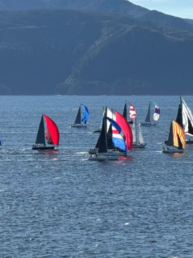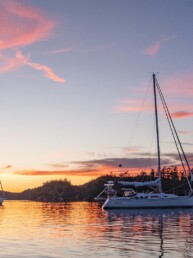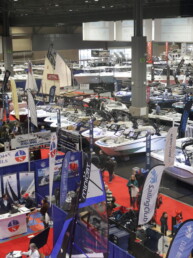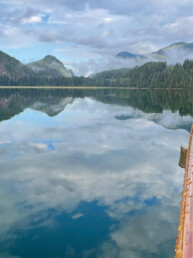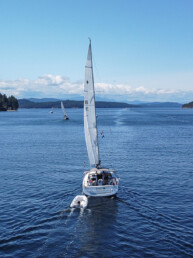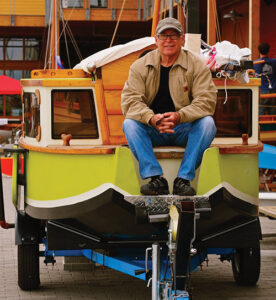
Marty Loken may be an octogenarian, but it’s hard to keep up with the small craft maven. Among his many endeavors that have buoyed the Pacific Northwest boating community are running a bevy of boating events, writing for Small Craft Advisor magazine, and being an active member of the Port Townsend Pocket Yachters.
Recently, I phoned Marty for details about the upcoming second Pacific Northwest Small Boat Festival on May 30-31, 2025, at Port Ludlow Marina. What I assumed would be a 30-minute call turned into a joyfully rambling two-hour conversation about Marty’s past and future in boats. We only ceased when I realized that it was my bedtime, and that we hadn’t even talked about the event itself. This seemed completely appropriate, given how sailors think: tides and winds wait for no man, but being present for a good yarn is a big part of the fun of hanging out with other boaters.
My follow-up call reached Marty aboard Raven, his 30-foot, 1930 John Alden motor cruiser, which he lived on for nearly three years. These days, he’s stationed ashore on Bainbridge Island, but has been camping out on Raven at Port Ludlow Marina between work sessions on his latest passion, a 20-foot trailerable “dreamboat” cabin cruiser that will have a tiny galley, a motor, pilothouse, and cuddy cabin for two. As he notes in one of his recent columns, “I know I’m damned lucky, and only semi-delusional when I say this: I’m still aging into boats, not out of boats. It feels like I’m slipping back to where it all started as a kid, in the smallest of boats.”
When Marty references his childhood, he describes a state of mind, as well as a physical place. His family ran Loken Lumber Specialties, a mill in Ballard, where he was “swimming in cedar.” In his family, “You didn’t buy much—you built it.” At age ten, he asked his father to build him a boat in their basement workshop. Marty’s dad pointed him towards the tools and told him, “You can figure it out.”
Despite the lack of instruction, Marty figured out enough to make three boats, one of which he sold to a neighbor. By the time he was a teenager, he was interested in restoration and started hanging out with “water rats,” who clearly had an impact on him. “Like all teenagers, I wanted to go fast,” Marty recalled. He started playing with hydroplanes, water skiing, and racing boats.
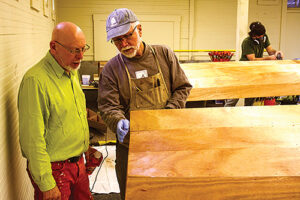
Marty dreamed of building boats as a career after high school, but concluded at that age that “it was a stupid idea.” His mother was a poet and his first editor. She nurtured another of his interests, writing. After working at his high school newspaper, he won a job at the Seattle Times as a copy boy, where he completed tasks around the newsroom. Eventually, he landed a job there as a cub reporter, writing stories on topics ranging from the Black Panthers to nesting birds on skyscrapers. An appreciation for working with photographers led him to a publishing job in Alaska. After becoming disillusioned with journalism, he shifted to photo licensing for the next 20 years. During this time he was always restoring or building boats, which allowed him to explore up and down the Inside Passage and the Salish Sea.
Marty eventually found his way back to Seattle, where he purchased the Wooden Boat Shop, a storefront near Lake Union that offered classes and sold supplies and tools. Despite Marty’s passion for boats, it didn’t turn out to be a viable business. That didn’t keep Marty away from boat work though. Soon he was organizing five boatrights at a restoration business that specialized in vintage launches, like Hacker Craft, Century, and Chris Crafts. There, he stayed busy coordinating a dozen projects at a time.
The pressure of contending with demanding customers made him wish he was working peacefully in his garage; so he moved farther from Seattle, eventually renting work space from his friend George Calkins, the designer of the legendary Bartender boats. During this venture he repaired and restored small wooden rowing and sailing boats, but he started getting interested in 1950s era trailerable powerboats from the early days of fiberglass production. He lovingly described their wraparound windows, sound hulls, and classically inspired interiors that were in need of love. “We had a great time,” he told me, “until we ran out of boats to restore.”
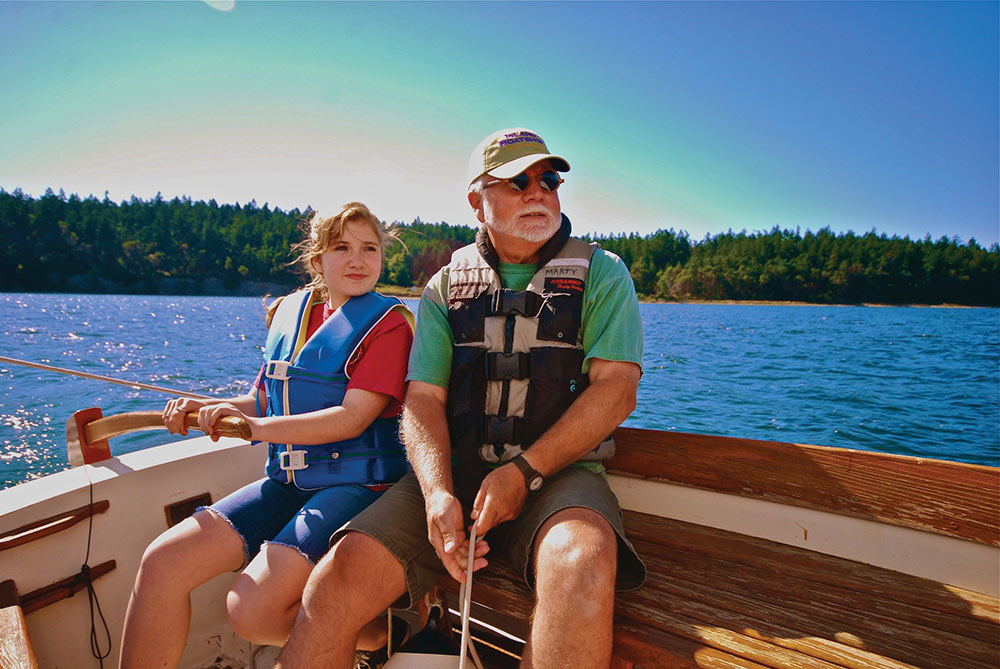
A persistent theme emerges in conversations with Marty: boats are interesting and rewarding. He’s not picky about the material, but he gets excited about the style, what the boat can do, and where it can take you. Although he’s had plenty of adventures on his own, he seems most pleased when his passions involve other people, which make them more fun.
For a few years, Marty organized the Pocket Yacht Palooza, a land-based display of small boats. This was followed by the associated “Crooza,” in which a subset of participants went camp-cruising for a few days afterwards. When these gatherings ended, Marty started dreaming of a new event to bring small boat sailors together—and in 2019, the Salish 100 was born. The event brought together dozens of sailors of small craft for a five-day cruise from Olympia to Port Townsend. Marty did much of the organizing himself, spending a modest $380 for a Coast Guard marine events permit. “Looking back, I realize I’m an event organizer,” he said. “I love helping people get on the water and learn something about small boat cruising. And learning from each other.”
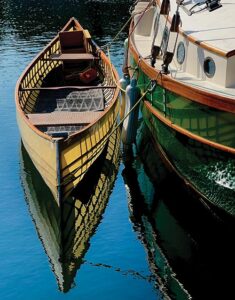
In 2024, along with some friends, Marty launched his newest project, the Pacific Northwest Small Boat Festival. During the event, which took place at the Port Ludlow Marina, 75 sail, power, or human-powered craft were displayed, many in guest slips, while others could be viewed on the grounds.
I shouldn’t have been surprised to learn that only one presentation took place; an experiment in electric propulsion led by participants. The festival is “a gab fest,” Marty explained, where people learn from each other. “You just set boat nerds free; you don’t have to do anything.”
This outlook is in keeping with Marty’s belief that the small craft community has a culture of teaching, learning, and free sharing of information. Last year’s event had a mix of boats from Washington, Oregon, British Columbia, and a few inland states, with regulars from past events and about a third of the attendees there for the first time.
To Marty, whatever kind of boat he currently owns is always the best one, because it captures his attention, allowing him to be creative, to dream, and to have fun with friends. If that mindset resonates, consider attending this year’s festival.
(The Northwest Small Boat Festival is open to trailerable craft under 25 feet and will begin the evening of Friday, May 30. Pre-registration to display a boat is required, but participation at the Port Ludlow Marina on the Saturday of is free. For more information, visit www.pocketyachters.com/events/sbf/ )
Bruce Bateau sails and rows traditional boats with a modern twist in Portland, Oregon. His stories and adventures can be found at www.terrapintales.wordpress.com
Bruce Bateau
Bruce Bateau sails and rows traditional boats with a modern twist in Portland, Ore. His stories and adventures can be found at www.terrapintales.wordpress.com


